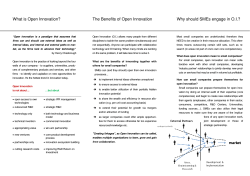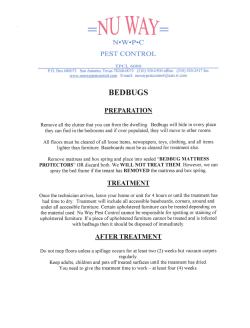
TIMBER QUALITY AND WORLD TRADE CHALLENGE
22 Indonesia issue one 2015 PARTNERS Timber quality and world trade challenge Java’s furniture makers ACIAR partnerships are helping smallholders make the most of their timber in Java’s central furniture-manufacturing region photos: Kris Sugiyanto A By Holly Reid t the centre of Indonesia’s furniture industry is the Javanese region of Jepara. For the past 100 years, furniture making has been the region’s main economic activity, contributing to more than a quarter of local incomes. It also constitutes 10% of the country’s furniture exports. The industry is characterised by more than 12,000 companies, mostly small-to-medium enterprises (SMEs). These form a long supply chain from tree growing to exporting. It spans loggers, processers, carpenters, retailers and traders. Despite keen international interest in carved furniture products, thousands of livelihoods that depend on furniture manufacturing in Jepara are at risk, owing to inefficiencies along the supply chain. These create difficulties for small-scale businesses trying to compete in a global market. Hand crafter making a mahogany cabinet. Supply chain challenges At the processing level, demand for timber outstrips supply and furniture makers are increasingly reliant on younger and lowerquality raw materials. There is pressure on SMEs to reduce waste and improve the standard of timber. This is compounded by external pressure from the global furniture community for fair-trade compliance and sustainably sourced timber. For manufacturers and retailers, the seller– buyer relationships are largely confined to domestic brokers, who absorb up to 50% of the sale profits. A lack of business acumen exists within SMEs, many of which do not keep financial accounts or know how to efficiently market their products. To help secure local timber markets and the future of the furniture-manufacturing industry, ACIAR has been involved with the rollout of two projects in Jepara aimed at strengthening the supply chain and protecting the future of smallscale enterprises in the community. At the source: improving furniture quality In 2009, ACIAR began a project that investigated the use of plantation timber for furniture production in the Jepara region. Working directly with SMEs, the project aimed to improve sawing, drying, treatment, manufacturing and finishing practices, and to enhance the quality of wood products made from plantation timbers. 23 PARTNERS issue one 2015 One particular challenge facing SMEs was an increased reliance on younger teak, which was being harvested early to meet farmers’ need for cash incomes. “Younger teak requires different processes for sawing, drying, treatment and finishing to maintain its quality,” explains ACIAR’s research program manager for forestry, Tony Bartlett. The project delivered a series of initiatives to improve wood-processing techniques and to add value to the finished product. In the process, it strengthened links between SMEs and partner organisations in education, research and training. “Building strong networks was an integral part of this project, with many stakeholders coming together to upskill SMEs across the region,” says project leader Associate Professor Barbara Ozarska from the University of Melbourne. “This was done through project workshops, seminars and courses, as well as training materials, which were distributed throughout the community.” Improved drying practices, trialled as part of the project, reduce the risk of degradation such as warping or cracking. The Indonesian Government and industry partners recognised these benefits and banded together to establish a community-owned kiln for SMEs in Jepara that did not have the resources to set up their own. “It’s such an excellent example of what you can do with ACIAR research when the private sector is involved,” Mr Bartlett says. “If you get a community working together to achieve a common good, everyone is able to contribute something along the way.” To market, to market As well as improving the quality of wooden furniture in the region, ACIAR has partnered with SMEs at the retail level to help improve the cost–benefit flow back into the community. Collaborating with Australian and Indonesian forestry research agencies, including the Center for International Forestry Research (CIFOR), another ACIAR project is working with SMEs to strengthen their market position. Through the establishment of the SmallScale Furniture Producers Association (APKJ), more than 200 SMEs in the Jepara region have come together to improve bargaining power against larger Indonesian companies and international furniture markets, such as Vietnam and China. The APKJ has set up initiatives to support SMEs in the development of practical marketing skills. This has enabled their participation in domestic and international trade exhibits, as well as the development of an online retail Indonesia’s President a Javanese furniture maker Newly elected President Joko ‘Jokowi’ Widodo’s first job was in his father’s furniture workshop. He eventually started his own business in the industry before making the move to politics. President ‘Jokowi’ has not forgotten his roots. His famous nickname was in fact coined by a French furniture buyer who had come to Java in search of the island’s famous wood products. portal, reducing the need for domestic brokers and ‘middlemen’. The APKJ is also working with SMEs to meet growing demand for fair-trade products and tabling local policy to guide the sustainable development of the industry in future years. According to project leader Dr Herry Purnomo from CIFOR, these efforts are helping SMEs return greater profits and stabilise the future of the industry. “Involving multiple stakeholders from across the industry in the design and execution of a project is the only way to create long-term, sustainable change,” he says. “If we are all committed to solving the problems, then we all become a part of the solution.” n ACIAR projects: FST/2006/117: Improving added value and small medium enterprises capacity in the utilisation of plantation timber for furniture production in Jepara region FST/2007/119: Mahogany and teak furniture: action research to improve value chain efficiency and enhance livelihoods More information: Tony Bartlett, research program manager (forestry), tony.bartlett@aciar.gov.au Top: FST/2006/117 taught hand sanders how to sand correctly as well as providing them with masks as part of an occupational health and safety campaign. Above: Hand crafting of wooden teak chair.
© Copyright 2025











